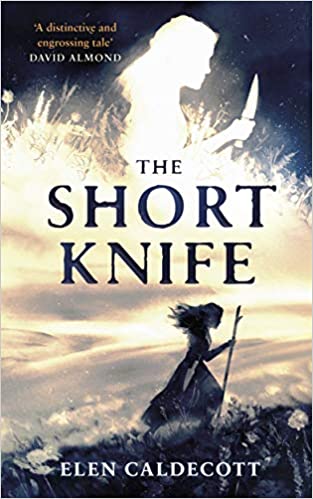
Price: £12.99
Publisher: oduct type: ABIS BOOKBrand: Andersen Press LtdHardcover BookCaldecott, Elen (Author)
Genre: Fiction
Age Range: 10-14 Middle/Secondary
Length: 400pp
Buy the Book
The Short Knife
Mai knows little of the world beyond the confines of the farm where she lives with her father, Tad and her older sister, Haf. She is safe – but the world has changed. The Roman Empire which had for so long provided the framework of their lives has gone – now it is the turn of the Saxons. The arrival of three warriors sees the destruction of the farm and forces Mai and her family to flee. Mai must face a very different world where men have all the power and choices have to be made, loyalties tested, where being true to oneself may be the most difficult choice of all.
Elen Caldecott has been quietly building her reputation as a writer of quirky, enjoyable, fast –paced well -crafted stories for KS2 readers. Here she takes a step forward to create a strong immersive historical novel that explores themes that still resonate – loyalty, belonging, difference, self , family, dispossession – these are things that do not change whether we are in the 21st century or sometime in the past. It is a brave move, though, to take us back to the time when the legions have left and British society has become fragmented, an easy prey to a people looking for new lands, a new home themselves. However, Caldecott recreates this world with confidence, not least through the character of Mai, feisty, opinionated, and infuriating even, a girl who has to learn herself. She steps off the page to take us with her as she faces this terrifying new world. Nor is she the only one to catch the attention. The cast is rich and varied, each a real character. Then there is the language. Here the author manages to create a sense of a past, not through a conscious aping of a language long gone but through a subtle use of linked epithets “bull-bent”, “sea-dark twilight” – bringing the rhythm of the other to the text while dialogue and narrative are contemporary without jarring.
This is a fascinating period. We are brought to realise that the country was not one homogenous people – there were Roman-Britons, Britons and Welsh, Saxons – all with their own customs ambitions. This is before an England. It is not, perhaps, a period much studied in the curriculum but for those who are curious stories tell of the Saxon leaders Hengist and Horsa, the lovely Rowena and the terrible banquet that ends in death. Caldecott has used her sources well to present the reader not with a history lesson, but a real past that we live as Mai tells her story. Highly recommended.





